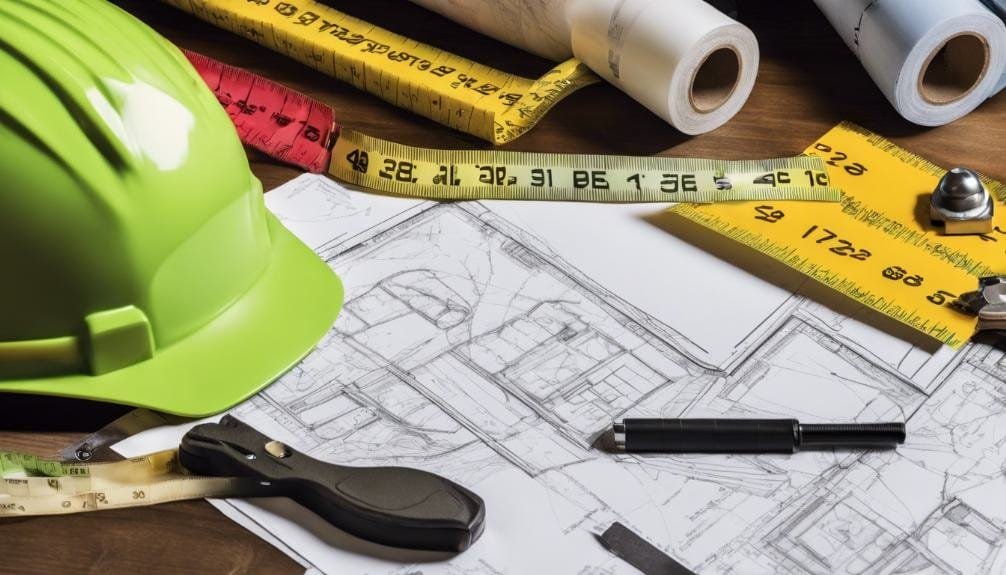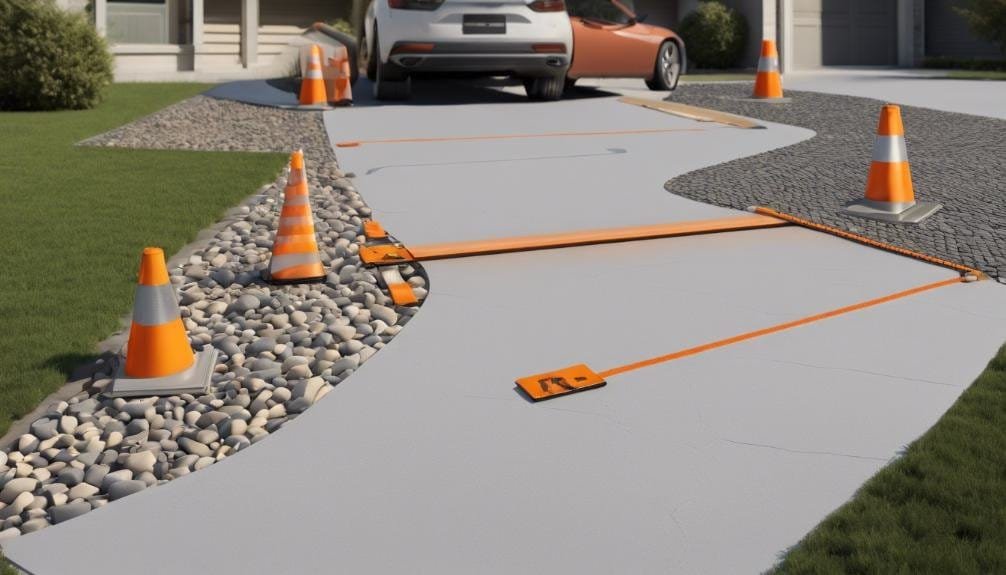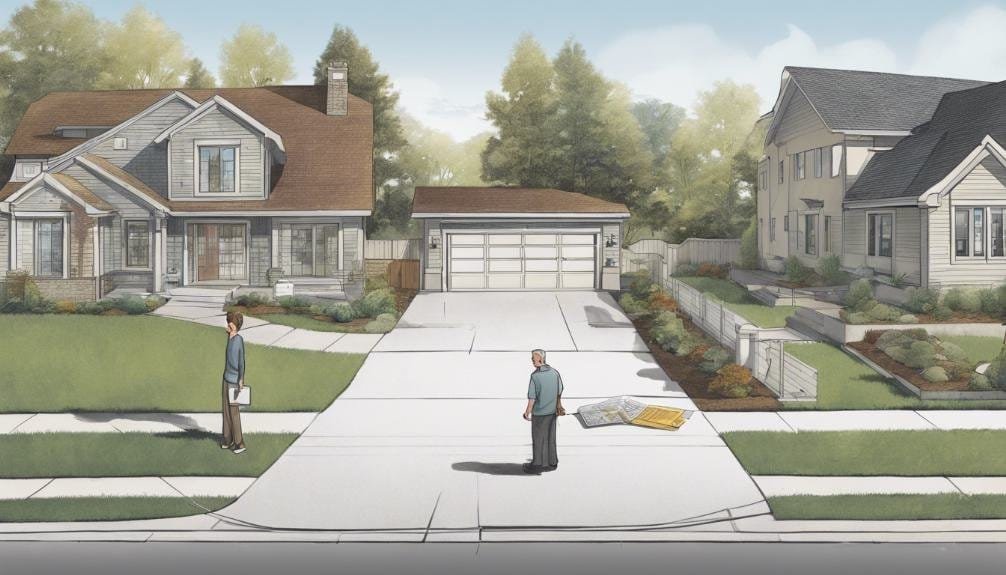When planning a driveway extension, you’ll likely need several permits, which vary by locality. If your extension intersects public roads or exceeds 25-30 square meters, a Driveway Modification Form and planning permission may be necessary. Maintaining existing road entrance dimensions is essential if you’re widening. Check if you need a Township Roadway Occupancy Permit for any adjacent sidewalk work. Additionally, regulations may mandate permeable materials for proper drainage. Engaging local authorities can provide clarity, ensuring you meet all requirements. To navigate this complex process effectively, understanding the specifics could prove beneficial for your project.
Key Takeaways
- A Driveway Modification Form and site sketch are typically required for driveway extensions.
- Planning permission may be necessary for extensions larger than 25-30 square meters.
- Local regulations often mandate the use of permeable materials for proper drainage.
- A Township Roadway Occupancy Permit (TROP) may be needed for work adjacent to public sidewalks.
Understanding Driveway Extension Permits

When considering a driveway extension, it’s crucial to understand that while many projects may not require permits, local regulations can vary considerably, so checking with your municipality is a must.
In many instances, you’ll find that a permit isn’t necessary unless your extension intersects with public roads. However, certain areas impose stricter requirements, particularly if the extension involves significant alterations to the existing road entrance dimensions.
For instance, if you’re widening your driveway, you might be asked to submit a Driveway Modification Form along with a detailed sketch. In some jurisdictions, such as Edinburgh, you’ll need planning permission if your new driveway exceeds 25-30 square meters.
Additionally, local regulations may enforce the use of permeable materials for your driveway extension to enhance water drainage, mitigate erosion, and manage stormwater runoff effectively.
To navigate these complexities, engaging with local contractors can be invaluable. They often possess up-to-date knowledge about the necessary permits and regulations tailored to your area.
Taking the time to understand these requirements guarantees that your driveway extension project proceeds smoothly and complies with local laws.
Local Regulations and Requirements
Local regulations governing driveway extensions can vary considerably, often necessitating careful review to verify compliance with specific municipal standards. To ascertain you’re meeting local requirements, it’s crucial to understand when a permit is required and what guidelines you must follow.
| Aspect | Requirement |
|---|---|
| Driveway Width | Typically does not require a permit, but check local rules. |
| New Driveways | May require planning permission if larger than 25/30 square meters. |
| Existing Road Entrance Dimensions | Must be maintained during any widening. |
| Driveway Modification Submission | Generally requires a Driveway Modification Form and a sketch. |
The use of permeable materials is often mandated for driveway extensions to promote effective water drainage. This compliance not only benefits the environment but also aligns with local regulations. Consequently, it’s critical to consult your local authority before commencing work to confirm whether a permit is required and to understand any specific conditions that must be met. Always prioritize adherence to regulations to avoid potential fines or required modifications later on.
Types of Permits Needed

Understanding the various types of permits needed for driveway extensions is essential to guarantee compliance with municipal regulations and to avoid costly delays in your project.
Typically, you’ll need a Driveway Modification Form, along with a detailed sketch of your proposed extension, submitted to local authorities for approval. If your project involves sidewalk installations or repairs adjacent to the driveway, you’ll also require a Township Roadway Occupancy Permit (TROP).
In some areas, you mightn’t need a permit for driveway widening, provided you maintain the existing road entrance dimensions. However, if your extension exceeds specific thresholds—usually around 25 to 30 square meters—you may need to secure planning permission. Local regulations can impose additional requirements regarding materials and drainage systems, which further emphasizes the importance of consulting with local authorities before starting your project.
To summarize, the types of permits you may need include the Driveway Modification Form, TROP, and possibly planning permission depending on your extension’s size. Always check local guidelines to verify you understand what permits you need and to streamline the process efficiently.
Application Process Overview
Maneuvering through the application process for driveway extensions requires careful attention to detail, starting with the submission of a Driveway Modification Form and an accompanying site sketch to your local authority. If your project affects the public right-of-way, you may also need a Township Roadway Occupancy Permit (TROP).
The processing timeline can vary based on location, but typically expect a wait of around five to ten business days after submitting all required documents. Understanding local regulations is essential, as they may dictate specific materials and drainage considerations that must be adhered to during the application process.
To help you navigate this process, consider the emotional impact of your decisions:
| Emotional Aspect | Importance in Application |
|---|---|
| Clarity | Guarantees you submit the correct forms |
| Preparedness | Reduces stress during the wait |
| Compliance | Avoids potential fines or delays |
| Community Engagement | Enhances neighborhood relations |
Consulting with local contractors or your engineering department can provide valuable insights into the necessary permits and specific requirements in your area. Understanding these elements will streamline your application process considerably.
Material Restrictions and Guidelines

After successfully steering through the application process, it’s vital to pay close attention to the material restrictions and guidelines that govern driveway extensions in your area. Understanding these restrictions is critical for compliance and can save you from costly modifications later on.
Here are three key factors to keep in mind regarding material restrictions:
- Permeability: Many local regulations mandate that driveway materials must be permeable to facilitate proper water drainage. This helps prevent erosion and reduces runoff issues.
- Compatibility: Your choice of materials may need to align with neighborhood aesthetics. Using materials that blend well with the surrounding environment can be a requirement, making sure that your extension doesn’t disrupt the visual harmony of the area.
- Permit Impact: The materials you select can influence whether additional permits are necessary. For instance, opting for recycled concrete or permeable pavers might meet specific guidelines that streamline the permitting process.
Always consult local authorities to clarify acceptable materials, as these restrictions can vary greatly based on location and zoning laws.
Engaging With Local Authorities
Engaging with local authorities before initiating a driveway extension project is essential for grasping the specific permit requirements that could impact your plans. Understanding local regulations is key, as you may need to submit a Driveway Modification Form and a sketch if your extension alters existing dimensions or conditions. Here’s a quick reference table to guide you:
| Requirement | Description | Importance |
|---|---|---|
| Driveway Modification Form | Required for any alterations to existing driveways | Guarantees compliance with local standards |
| Sketch Submission | Visual representation of planned extension | Helps authorities assess design and impact |
| Zoning Regulations | Local laws governing driveway width and materials | Prevents violations and fines |
Before moving forward, check with local zoning laws to avoid potential violations related to driveway pavement. Consulting experienced local contractors can also provide valuable insights into steering through the permitting process. Finally, remember that the timeline for permit processing can vary, so it’s wise to plan ahead and allow sufficient time for your application to be reviewed and approved.
Highway Occupancy Permits Explained

Understanding Highway Occupancy Permits (HOPs) is vital for property owners and developers aiming to secure safe access to state highways while adhering to PennDOT’s stringent regulations. These permits help manage the interface between local roads and the state highway system, guaranteeing smooth traffic flow and the highway’s structural integrity.
When applying for an HOP, consider these key elements:
- Design Compliance: Your driveway or access point must meet specific design guidelines to guarantee safety and functionality.
- Drainage Management: Proper drainage plans are essential to prevent water accumulation that could affect the highway and surrounding areas.
- Maintenance Responsibilities: You’ll need to understand ongoing responsibilities for the upkeep of any modifications you make to the access point.
The HOP process, outlined in Publication 282, balances economic development with the necessity of highway safety. Utilizing the ePermitting System streamlines your application, making it easier to manage and track your request.
Common Permit Application Mistakes
Maneuvering the permit application process can be challenging, and common mistakes often lead to unnecessary delays or rejections for driveway extensions. To guarantee your application is successful, it’s essential to avoid these pitfalls.
| Common Mistake | Consequence | Prevention Tip |
|---|---|---|
| Ignoring local zoning laws | Application rejection | Research local regulations thoroughly |
| Incomplete documentation | Delays or denials | Double-check all required documents |
| Not securing curb opening approvals | Complications in the process | Obtain necessary approvals beforehand |
| Overlooking permeable material rules | Non-compliance issues | Confirm material requirements with local guidelines |
| Submitting without contractor input | Misunderstandings of requirements | Consult experienced contractors early |
Always verify that your driveway extension complies with property line regulations to avoid disputes or further complications. By keeping these common mistakes in mind and taking proactive measures, you can streamline your permit application process and enhance your chances of approval. Understanding these factors will put you on the right path toward a successful driveway extension project.
Timeline for Permit Approval

The timeline for permit approval varies considerably based on the type of driveway extension and local jurisdiction requirements. It is vital to be aware of specific processing times for each necessary permit. Understanding these timelines can help you plan your project effectively.
- Driveway Modification Form: Typically takes about five business days for processing if all required documents are submitted. Confirm your application is complete to avoid delays.
- Grading Permit: This application usually requires ten business days for processing. Be certain you provide all necessary information, as incomplete applications can extend this timeline.
- Township Roadway Occupancy Permit (TROP): If your driveway extension intersects with public roads, you’ll need this permit, generally processed in five business days. Compliance with local regulations is significant, especially regarding how many feet from the edge of the roadway your driveway is positioned.
Keep in mind that planning permission for new driveways may vary further, particularly in areas with strict local council review processes. By being aware of these timelines, you can better manage your expectations and project schedule.
Consulting Professionals for Assistance
Maneuvering the complexities of driveway extension permits can be challenging, so consulting professionals can greatly enhance your project’s success and compliance with local regulations. Engaging experienced contractors provides you with valuable insights into the specific zoning laws and permit requirements that govern driveway extensions. They assess site-specific conditions, identifying potential obstacles that could complicate the installation process or delay permit acquisition.
When you consult professionals, you considerably reduce the risk of costly mistakes. They’ll guarantee that all necessary permits, such as Driveway Modification Forms or Township Roadway Occupancy Permits, are submitted correctly and timely. Furthermore, local contractors often maintain established relationships with local authorities, which can expedite the overall permit approval process.
Additionally, professionals offer guidance on selecting suitable materials that meet local requirements and drainage regulations, optimizing both the aesthetics and functionality of your driveway.
To navigate these complexities efficiently, please click [here] to find reputable contractors in your area who specialize in driveway extensions. By doing so, you’ll guarantee that your project adheres to local standards while minimizing potential hurdles.
Conclusion
Steering through the permit process for driveway extensions may seem intimidating, but it’s essential for ensuring compliance with local regulations.
While you might worry about delays, understanding the requirements and preparing your application thoroughly can greatly expedite approval.
By consulting professionals, you not only gain valuable insights but also enhance the likelihood of a smooth process.
Investing time upfront saves you from costly mistakes down the line, ultimately leading to a successful driveway extension that meets all necessary guidelines.
Get Started on Your Driveway Extension in Central PA!
Are you considering a driveway extension but overwhelmed by the permitting process? Nathan Paving is here to help! Our knowledgeable team will walk you through obtaining necessary permits and ensuring compliance with local regulations in Central PA, making your project seamless and stress-free.
There’s no better time to enhance your home’s functionality and beauty. Request your free quote today! Dive into our services, such as tar and chip driveway and seal coating, to make your driveway the envy of the neighborhood!
